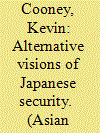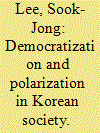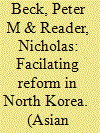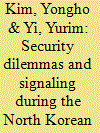|
|
|
Sort Order |
|
|
|
Items / Page
|
|
|
|
|
|
|
| Srl | Item |
| 1 |
ID:
071716


|
|
|
|
|
| Publication |
2005.
|
| Summary/Abstract |
In the post-cold war world Japanese security policy has grasped at nationalistic elements within Japanese society in attempts to "securitize" itself by means of a foreign policy independent of the United States. The role of absolute and relative gains in the making of Japanese foreign and security policy will be examined in light of alternative security issues. Working from International Security: A New Framework for Analysis by Barry Buzan et al., this article will examine Japanese security policy in light of Japan's attempts to securitize itself in non-traditional ways that impact traditional security.
|
|
|
|
|
|
|
|
|
|
|
|
|
|
|
|
| 2 |
ID:
071715


|
|
|
|
|
| Publication |
2006.
|
| Summary/Abstract |
This article identifies and analyzes economic and political factors behind the polarization of Korean civil society. Both the growing economic disparity between the rich and the poor and the tightened job market for the younger generation since the 1997-1998 financial crisis have contributed to a sharp divergence in views on how best to approach reforms. More importantly, political flux and instability deriving from the current "transitional politics" have aggravated the political polarization. The three major actors in this transitional politics-power elites, civic movement organizations, and the media-play a divisive rather than unifying role. Given that political institutions are still weak and a political culture for compromise remains largely absent, polarization of Korean society is likely to continue until the intense passions of the politicized civil society are dampened by successful institutionalization of conflict resolving mechanisms.
|
|
|
|
|
|
|
|
|
|
|
|
|
|
|
|
| 3 |
ID:
071717


|
|
|
|
|
| Publication |
2005.
|
| Summary/Abstract |
This article challenges the conventional view of China's human-rights policy by carefully tracing the development of human rights discourse in China since 1978. While agreeing that external pressure does play an important role in shaping China's human-rights discourse and policy, the article finds that the changes in Chinese discourse cannot adequately be explained by external factors such as Western criticisms, particularly since 1989. Instead, cognitive changes resulting from self-reflection by the Chinese government upon China's past, especially concerning the Cultural Revolution, laid the foundation for China's changing attitudes toward human rights in subsequent years. Moreover, China's changed attitudes indicate that to a limited degree the leadership has already internalized some aspects of international human-rights norms.
|
|
|
|
|
|
|
|
|
|
|
|
|
|
|
|
| 4 |
ID:
071712


|
|
|
|
|
| Publication |
2005.
|
| Summary/Abstract |
Despite the continuing nuclear confrontation between North Korea and the world, the North is undergoing the most profound economic changes since the founding of the state. The international community can improve North Korea's chances of making a successful transition by first taking advantage of the new opportunities to train North Koreans in financial, technical, and market economic skills. Additionally, the international community can address infrastructural constraints, and undertake comprehensive needs assessments. North Korea will not and should not receive significant international development assistance until it gives up its nuclear weapons, but increasing knowledge about the economy will improve the prospect that any deal reached on the nuclear issue will lead to transformation of the economy.
|
|
|
|
|
|
|
|
|
|
|
|
|
|
|
|
| 5 |
ID:
071711


|
|
|
|
|
| Publication |
2005.
|
| Summary/Abstract |
Though the North Korean nuclear issue has resurfaced- subsequently restraining inter-Korean cooperation-this impasse has not fettered the South Korean government in such a way that it cannot maneuver to improve the ROK-DPRK relationship. Seoul must take small steps to solve individual problems in the North-South relationship, and methodically prepare for systematic advances in inter-Korean relations once the nuclear impasse is settled. Furthermore, Seoul must focus on both quantitative and qualitative improvements in the inter-Korean relationship, look more at economic cooperation that emphasizes mid- to long-term development of North Korea, and concentrate on developing a blueprint for the North's recovery that acknowledges greater involvement from regional actors. This article sets out to find that new direction in which South Korea must proceed.
|
|
|
|
|
|
|
|
|
|
|
|
|
|
|
|
| 6 |
ID:
071713


|
|
|
|
|
| Publication |
2005.
|
| Summary/Abstract |
International organizations will have an important role to play in an accelerated program of development assistance in North Korea once the constraints on such a program are removed through a political settlement of the nuclear issue. The critical roles of the multilateral agencies will be coordinating the aid effort, supporting development planning, building development capacity, investing in infrastructure, and streamlining private investment. NGOs, building on experience already gained in North Korea, will also make crucial contributions, such as by focusing on community-level engagement, vertical and horizontal linkages, and innovation and risk-taking. These roles will be essential for coaxing North Korea along the path of economic reform and opening, gaining the trust of the North Korean people, and keeping the donor publics engaged.
|
|
|
|
|
|
|
|
|
|
|
|
|
|
|
|
| 7 |
ID:
071714


|
|
|
|
|
| Publication |
2005.
|
| Summary/Abstract |
North Korea's provocative foreign policy is the result of its security dilemma. While the first nuclear crisis in 1993 was the result of North Korea's security dilemma instigated by the post-cold war international environment, the current crisis involves two sets of conflicting security dilemmas (North Korean and U.S.). After delineating North Korea's foreign-policy behavior in terms of an offense-defense theory, we put North Korea's verbal statements and actual policy behavior into two graphs to describe how the international environment prompted Pyongyang's security dilemma that in turn generated its provocative behavior. We interpret North Korea's coercive foreign-policy behavior as a design to project a desired image of a rogue state that is prepared to engage in a high level of risk-taking if Washington and Seoul impose sanctions or refuse concessions. The study finds variations between North Korea's verbal statements and its actual policy behavior, signifying that Pyongyang's militant commentaries are not accompanied by actual provocation. In some cases, it even seems that such announcements signal a willingness to negotiate.
|
|
|
|
|
|
|
|
|
|
|
|
|
|
|
|
|
|
|
|
|